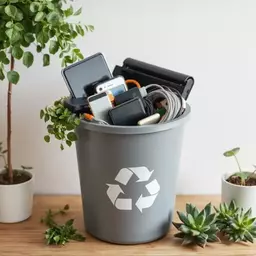In a world where every purchase has an environmental impact, understanding mindful consumption isn't just a trend—it's a necessity. As we navigate through our daily habits, the choices we make can either contribute to sustainability or exacerbate the climate crisis. Are you ready to transform your consumption habits for a healthier planet?
What You Will Learn
- Mindful consumption is about being aware of the impact of our purchases, promoting sustainability through intentional choices.
- Small daily shifts, like using reusable bags or opting for local products, can significantly reduce waste and promote eco-friendly practices.
- Supporting companies with ethical practices and eco-friendly products helps align consumer habits with personal values and sustainability goals.
- Government regulations, such as bans on single-use plastics and incentives for renewable energy, can drive positive changes in consumer behavior and promote mindful consumption.
- Organizations play a crucial role in raising awareness and providing resources that encourage individuals to adopt sustainable habits for a healthier planet.
Impact of Mindful Consumption on Environmental Sustainability
Understanding how mindful consumption can lead to significant reductions in waste and support ethical practices is essential for creating a sustainable future. For example, exploring eco-friendly junk removal can further highlight ways to manage waste responsibly. Below are key comparisons and statistics illustrating these impacts.
Single-Use Plastic Reduction
Countries like France and Kenya have enacted single-use plastic bans, leading to a dramatic reduction in plastic waste. For example, France reported a 70% decrease in single-use plastics within two years of the ban.
Extended Producer Responsibility (EPR)
In the European Union, EPR policies ensure manufacturers are responsible for their products' lifecycle, resulting in a 50% increase in sustainable product designs over five years.
Incentives for Renewable Energy
Governments offering tax credits for solar panel installations have seen a 35% increase in renewable energy adoption among homeowners, significantly reducing carbon footprints.
Recycling Rates
Germany's "Green Dot" system has increased recycling rates to over 60%, showcasing the effectiveness of structured recycling programs in reducing landfill waste.
Understanding Mindful Consumption and Its Environmental Relevance
In today's fast-paced world, where convenience often trumps sustainability, understanding mindful consumption has become more crucial than ever. At Eco Habits Daily, we believe that every choice we make can have a ripple effect on our planet. By focusing on *mindful consumption*, we can shift our habits toward a more eco-friendly lifestyle—one that not only benefits us but also the environment.
So, what exactly is mindful consumption? It's about being aware of what we buy, using resources wisely, and considering the impact of our choices on the Earth. When we shop mindfully, we reflect on whether we genuinely need an item, how it was produced, and whether it aligns with our values. This practice helps us make better decisions that align with our commitment to sustainable living.
Defining Mindful Consumption in Today's Context
Mindful consumption isn't just a trend; it's a revolutionary way of thinking about our **daily choices**. In our current climate crisis, embracing this approach can lead to meaningful change. For instance, instead of grabbing a plastic water bottle on the go, we might choose a reusable one instead. This small shift can significantly reduce plastic waste and save money in the long run!
When we talk about mindful consumption, it involves recognizing the *sources* of what we consume. Are we supporting local businesses or buying from companies with ethical practices? By making intentional choices, we can create a positive impact on both our communities and the environment.
- Reflect on your shopping habits.
- Consider the lifespan of products.
- Prioritize local and sustainable brands.
Exploring the Concept of Mindful Consumption
The concept of mindful consumption starts with awareness—knowing what we buy and why we buy it. Each purchase can contribute to a larger goal of sustainability. As someone who cares deeply about the environment, I often think about how my shopping choices affect waste and pollution. By evaluating my habits, I aim to make more informed decisions that support a low-waste lifestyle.
Furthermore, it’s essential to remember that mindful consumption can fit into our busy lives. It doesn’t require a complete overhaul of our routines. Instead, we can take *small steps* that gradually lead to a more sustainable lifestyle. For example, choosing to carry reusable bags when shopping is an excellent way to start!
Linking Mindful Consumption to Environmental Awareness
Mindful consumption is strongly linked to *environmental awareness*. When we become more conscious of our habits, we start to see the bigger picture regarding our planet's health. This awareness leads us to ask important questions: How much waste am I producing? Are my choices harming wildlife and ecosystems?
As we become more aware, we can inspire others in our circles, creating a community of eco-conscious individuals. It’s empowering to realize that our choices matter, and at Eco Habits Daily, we’re dedicated to fostering a mindset that prioritizes sustainable living. Together, we can make a difference, one mindful choice at a time!
Eco-Friendly Products and Ethical Consumption
Choosing eco-friendly products is a cornerstone of mindful consumption. These products not only have a lesser impact on the environment but also support companies that prioritize ethical practices. By opting for sustainable options, we can align our purchases with our values.
Here are some tips for selecting sustainable options:
- Look for products with minimal packaging.
- Check for certifications like Fair Trade or Organic.
- Support local artisans and businesses.
Choosing Sustainable Options for Mindful Consumption
As consumers, we hold the power to shape markets through our choices. When we choose sustainable options, we send a message to companies: we care about the planet! From eco-friendly cleaning supplies to biodegradable containers, there are so many alternatives available today.
Additionally, I encourage you to explore second-hand shopping. Thrift stores and online marketplaces offer a treasure trove of items that are not only unique but also help reduce waste. Every time we choose to buy second-hand instead of new, we contribute to a more sustainable future!
Mindful consumption is not just about what we buy; it’s a journey towards a lifestyle that honors both our well-being and that of the Earth. Let's embrace this journey together and make choices that reflect our commitment to a brighter, more sustainable world!
Quick Summary
Here's a brief recap of the key points discussed so far:
- Mindful consumption is about being aware of our buying habits and their impact on the environment.
- Choosing eco-friendly products and supporting sustainable practices can lead to significant positive changes.
- Policies and regulations play a crucial role in promoting mindful consumption and encouraging businesses to adopt eco-friendly practices.
Frequently Asked Questions About Mindful Consumption
- What is mindful consumption?
- Mindful consumption is the practice of being aware of what you buy, using resources wisely, and considering the environmental and social impact of your choices. It involves reflecting on whether an item is truly needed, how it was produced, and if it aligns with your values.
- How does mindful consumption benefit the environment?
- Mindful consumption reduces waste, conserves natural resources, supports ethical and sustainable production, and lowers your carbon footprint. By making intentional choices, you contribute to a healthier planet and encourage businesses to adopt more eco-friendly practices.
- What are some examples of mindful consumption practices?
- Examples include using reusable bags and water bottles, buying second-hand items, supporting local and ethical businesses, choosing products with minimal packaging, and opting for durable goods over single-use items.
- How do government policies support mindful consumption?
- Government policies, such as bans on single-use plastics, Extended Producer Responsibility (EPR) programs, and incentives for renewable energy, encourage sustainable practices by holding manufacturers accountable and promoting eco-friendly alternatives.
- What role do organizations play in promoting mindful consumption?
- Organizations, including non-profits and businesses, raise awareness through educational campaigns, community programs, and partnerships. They provide resources and inspire individuals to adopt sustainable habits, amplifying the movement towards mindful consumption.
Policy and Institutional Support for Mindful Consumption
Policies play a crucial role in encouraging sustainable practices. By implementing effective regulations, governments can help create an environment where mindful consumption is not just desirable but also practical. From incentives for businesses to adopt eco-friendly practices to penalties for excessive waste generation, the right policies can lead to a significant shift in consumer behavior.
For instance, imagine living in a place where local councils provide tax breaks for zero-waste businesses! This not only rewards companies for their efforts but also encourages others to follow suit. As we explore various examples, you'll see how strong policy frameworks can pave the way for a more sustainable future. For more practical tips, consider exploring easy eco-friendly habits to start.
How Regulations Can Encourage Sustainable Practices
There are several noteworthy regulations that have successfully promoted mindful consumption worldwide. Below are a few examples:
- Single-Use Plastic Bans: Countries like France and Kenya have enacted bans on single-use plastics, dramatically reducing plastic waste.
- Extended Producer Responsibility (EPR): In regions like the European Union, EPR policies hold manufacturers responsible for their product’s lifecycle, encouraging sustainable design.
- Incentives for Renewable Energy: Governments offer tax credits to homeowners who install solar panels, fostering a shift toward renewable energy sources.
These types of regulations not only inspire individual actions but also create a cultural shift toward sustainability. They demonstrate how government action can empower citizens and businesses alike to make more mindful choices.
Examples of Effective Policies from Around the World
Real-world examples help us understand the effectiveness of various policies. Take a look at these successful initiatives:
- California’s Green Building Standards: These regulations require new buildings to meet energy-efficient standards, reducing overall resource consumption.
- Germany’s Recycling System: Known as the "Green Dot" system, it has led to recycling rates soaring to over 60% by making producers responsible for recycling packaging waste.
- New York City’s Composting Program: This initiative encourages organic waste recycling, significantly cutting down on landfill waste.
Seeing these successful policies at work can motivate other cities and countries to implement similar measures. It reminds us of the power of collaboration between policymakers and communities to drive mindful consumption.
The Role of Organizations in Promoting Mindful Consumption
Organizations also play a vital role in advancing the mission of mindful consumption. Non-profits, universities, and even businesses can lead the charge in raising awareness and providing resources.
Through community programs, educational workshops, and partnerships, these organizations can inspire individuals to adopt sustainable habits. For instance, understanding recycling tips for your home can be a direct result of such initiatives. Let's dive into some case studies that showcase successful initiatives making a tangible difference!
Case Studies of Successful Initiatives
Here are a few organizations that have made significant strides in promoting mindful consumption:
- Earth Day Network: This global organization mobilizes millions of people to engage in environmentally friendly practices every April 22nd and year-round.
- Sustainable Agriculture Network: They promote eco-friendly farming practices, helping farmers shift toward organic methods that nourish the earth.
- The Sierra Club: Through campaigns and community activism, they advocate for sustainable energy solutions and conservation efforts.
These organizations connect people to the resources they need to make informed choices, reinforcing the idea that small changes can lead to significant impacts. It’s exciting to see how collaboration can amplify our efforts toward a more sustainable future!
Recap of Key Points
Here is a quick recap of the important points discussed in the article:
- Mindful Consumption: Focus on being aware of purchases, considering their necessity, production methods, and environmental impact.
- Community Impact: Support local businesses and ethical practices to create positive change in communities and reduce environmental footprints.
- Small Steps Matter: Incorporate small changes into daily routines, such as using reusable bags or choosing second-hand items, to promote sustainability.
- Policy Support: Recognize the importance of regulations that encourage sustainable practices, such as plastic bans and producer responsibility laws.
- Organizational Initiatives: Engage with organizations that promote eco-friendly habits through awareness campaigns and community programs.










